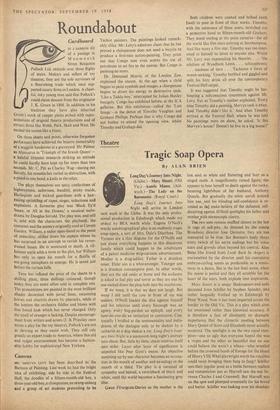Roundabout
Cardboard
IN A NARROW slit On these sheets and printi, otherwise forgotten performers have achieved the bizarre immortality of a waggish headstone in a graveyard. Mr. Palmer as Ahasuerus in 'Triumph of the Jewish Queen'— a baleful Oriental monarch striking an attitude he could hardly have kept up for more than two seconds. Mr. C. Pitt as Charley Wag—staring out fiercely, his moustaches curled to distraction, with a pistol in one hand, a knife in the other.
The plays themselves are spicy confections of highwayman, sailormen, banditti, pretty maids, Harlequins and wicked guardians with a hair- raising sprinkling of rapes, sieges, seductions and explosions. A favourite play was 'Black Ey'd Susan, or All in the Downs,' a nautical melo- drama by Douglas Jerrold. The play was, and still is, sold with the characters, the playbook, the costumes and the scenery originally used at Covent Garden. William, a sailor open-faced to the point of imbecility, strikes down his captain whom he has surprised in an attempt to ravish his raven- tressed Susan. He is sentenced to death. A vil- lainous uncle adds a twist to the plot, but William has only to open his mouth for a flotilla of sea-going metaphors to emerge. He is saved just before the curtain falls.
Time has inflated the price of the sheets to a shilling plain, three shillings coloured, though today they are more often sold in complete sets. The prosceniums are painted in the most brilliant shades decorated with jovial lions, swimming horses and chariots drawn by peacocks, while at the bottom the orchestra fiddles and blows with that bored look which has never changed. Only the smell of oranges is lacking. Despite encourage- ment from writers and actors (J. B. Priestley once wrote a play for the toy theatre), Pollock's are not as thriving as they could wish. They still rely greatly on export trade to America, where this old and vulgar entertainment has become a fashion- able hobby for sophisticated New Yorkers.
Canvas
MR. MERVYN LEVY has been described as the Barnum of Painting. Last week he had the bright idea of exhibiting, side by side at . the Festival Hall, the doodles of a fifteen-month-old boy, a three-year-old boy, a chimpanzee, an orang-outang and a group of art students pretending to be Tachist painters. The paintings looked remark- ably alike. Mr. Levy's admirers claim that he has proved a chimpanzee does not need a bicycle to produce a first-rate action-painting. They point out that Congo now even scorns the use of petroleum to set fire to the canvas. But Congo is painting no more.
Dr. Desmond Morris; of the London Zoo, explained the reason. At the age when a child begins to paint symbols and images, a chimpanzee begins to divert his energy to destructive ends. `Like a Teddy-boy,' interrupted Sir Julian Huxley benignly. Congo has exhibited before, at the ICA galleries. But this exhibition—called the 'Lost Image'—is the debut of Timothy Vaughan and Graham Phillips. Perhaps that is why Congo did not bother to attend the opening view, whilst Timothy and'Graham did. Both children were coaxed and bribed (with food) to pose in front of their works. Timothy, with the assurance of three years, stretched out a protective hand to fifteen-month-old Graham. They stood smiling at the press cameras—for all the world like film stars arriving at Southampton. And like many a film star, Timothy was too inter- ested in himself to listen to anyone else. Whilst Mr. Levy, was expounding his theories . . . 'the nihilism of Wyndham Lewis . . . schizophrenic . . . madness of zero . . . Tachisme a form of womb-seeking,' Timothy burbled and giggled and spilt his fizzy drink all over the contemporary Festival Hall carpet.
It was suggested that Timothy might be har- bouring a subconscious resentment against Mr. Levy. For as Timothy's mother explained, !Every time Timothy did a painting, Mervyn took it away. And Timothy didn't like it.' And when Timothy arrived at the Festival Hall, where he was told his paintings were on show, he asked, 'Is this Mervyn's house? Doesn't he live in a big house?'


































 Previous page
Previous page